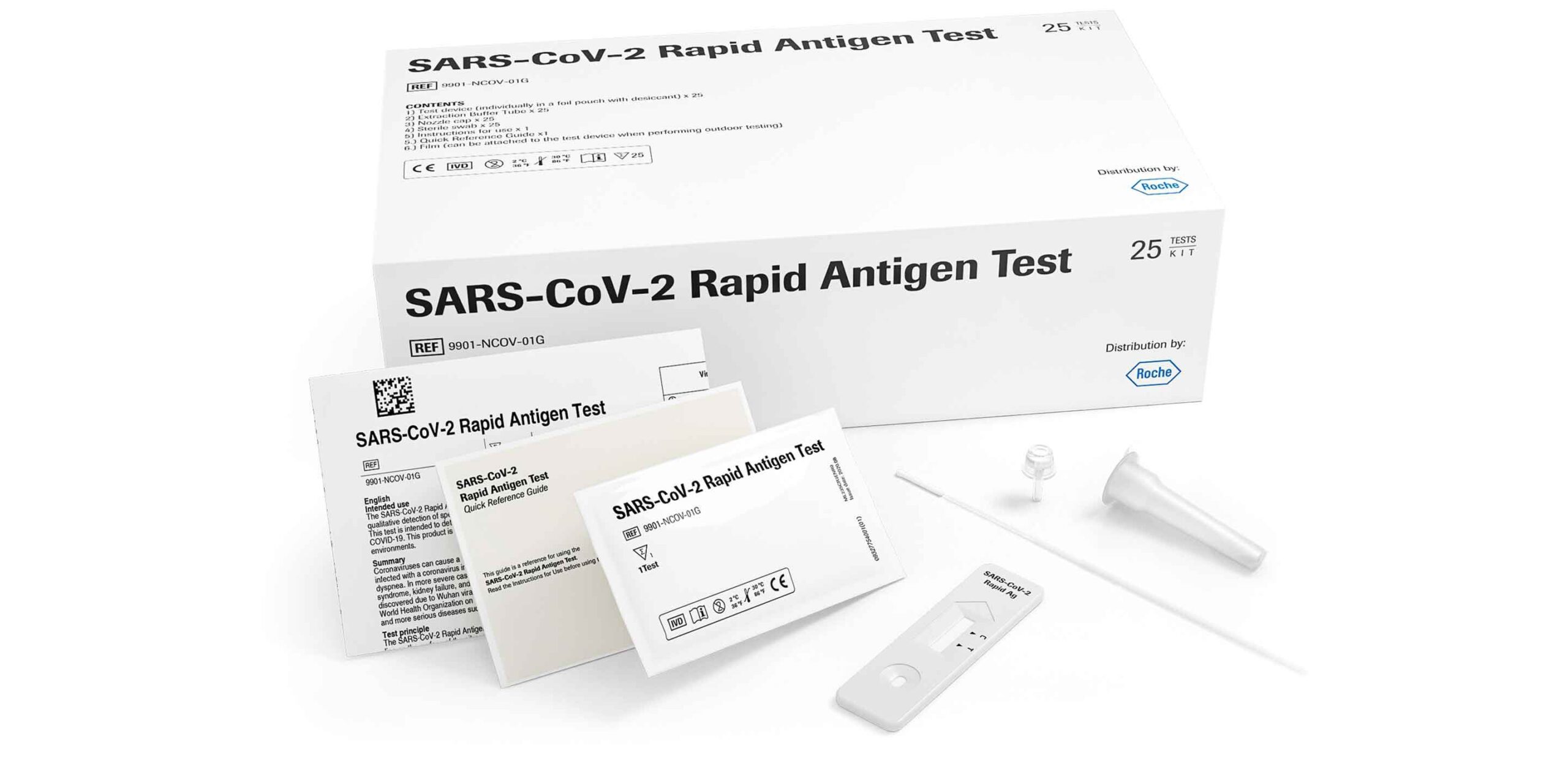- Rapid test to support the American public’s fight against the COVID-19 pandemic, with availability to purchase over-the-counter (OTC) at pharmacies and retailers nationwide
- The COVID-19 At-Home Test uses a simple nasal swab sample to enable individuals to self-test at home and receive accurate, reliable and quick results in as few as 20 minutes for SARS-CoV-2 and all known variants of concern, including Omicron.
- EUA granted through Roche’s participation in the National Institutes of Health (NIH) Rapid Acceleration of Diagnostics (RADx) Independent Test Assessment Program to bring rapid tests to the OTC market
Basel, 24 December 2021 – Roche (SIX: RO, ROG; OTCQX: RHHBY) today announced that the U.S. Food and Drug Administration (FDA) has granted Emergency Use Authorization (EUA) for its COVID-19 At-Home Test.¹ The test uses a simple anterior nasal swab sample that can be conveniently self-collected and self-tested by individuals aged 14 years and older, and by an adult for children aged 2-13 years old.² The test is able to produce accurate, reliable and quick results in as few as 20 minutes for SARS-CoV-2 and all known variants of concern, including Omicron.
The FDA’s EUA decision stems from Roche’s participation in the National Institutes of Health (NIH) Rapid Acceleration of Diagnostics’ (RADx) Independent Test Assessment Program (ITAP), which aims to accelerate the regulatory review and availability of high-quality, accurate and reliable OTC tests to the American public. The COVID-19 At-Home Test was prioritised by the FDA based on Roche and SD Biosensor’s ability to deliver large quantities of high-quality tests and ramp up manufacturing to meet future demands.
Starting in January, the COVID-19 At-Home Test will be available across the United States and in accordance with local guidelines and testing strategies. At the time of launch, Roche has the capacity to produce tens of millions of tests per month to help support the pandemic response. The COVID-19 At-Home Test offers a convenient frequent testing option without the need to visit a healthcare provider.
“The COVID-19 pandemic continues to shed light on the critically important role that rapid self-testing plays in empowering individuals to protect their personal health and the health of their families and communities,” said Thomas Schinecker, CEO, Roche Diagnostics. “At this inflection point in the American public’s fight against COVID-19, we are proud to have worked in close collaboration with the US Government to introduce and expand access to accurate, reliable and high-quality at-home tests.”
“Expanding access to rapid testing solutions for all patients in the United States is essential to public health and the pandemic response,” said Matt Sause, President & CEO of Roche Diagnostics North America. “As long as there remains a need for reliable testing, Roche will continue to invest in effective solutions to ensure there are testing options available to those who need them.”
Together with the COVID-19 At-Home Test, Roche will offer NAVIFY® Pass as a solution to organizations who want to allow individuals and health care professionals to remotely and securely store, display, and share results. All COVID-19 At-Home Tests are supplied with a unique data matrix, enabling NAVIFY® Pass to automatically link individuals’ test results to their respective test devices.
The launch will be in partnership with SD Biosensor Inc., with whom Roche has a global distribution agreement and previously launched a range of tests throughout 2020 and 2021 in countries outside of the U.S. that accept the CE Mark, including the SARS-CoV-2 Rapid Antigen Tests (Nasopharyngeal/Nasal), SARS-CoV-2 Antigen Self Test Nasal, SARS-CoV-2 Rapid Antibody Test and SARS-CoV-2 & Flu A/B Rapid Antigen Test.3 The test becomes the first rapid antigen test for SARS-CoV-2 from Roche to receive FDA Emergency Use Authorization, and the sixth rapid test overall to accompany Roche’s comprehensive portfolio of diagnostic solutions to help healthcare systems across the globe combat the COVID-19 pandemic through laboratory testing and at the point of care. Roche Diagnostics’ portfolio includes a wide range of molecular, rapid serological and digital solutions that help diagnose and manage COVID-19 during the initial stages of infections, during the recovery phase, and following the resolution of infection.
About the COVID-19 At-Home Test2
The COVID-19 At-Home Test is a rapid chromatographic immunoassay for the qualitative detection of the nucleocapsid protein of SARS-CoV-2 present in anterior nasal swab samples. In a prospective clinical study, the COVID-19 At-Home Test showed a relative sensitivity of 95.3% (95% CI: 84.5 to 98.7%) and a relative specificity of 100% (95% CI: 95.7 to 100%). Overall the studies included 138 symptomatic individuals (128 evaluable samples).² This test is intended for*: 1) Non-prescription home use (OTC) within the first 6 days of symptom onset; 2) Non-prescription home use with or without symptoms or other epidemiological reasons to suspect COVID-19 when tested twice over three days with at least 24 hours (and no more than 48 hours) between tests.
The currently available sequences of variants of concern, including the Omicron variant SARS-CoV-2 (B.1.1.529), have been analysed and we can confirm that there is no impact on the performance of the test.
About antigen testing
An antigen test detects proteins which are structural or functional components of a pathogen and are very specific to that pathogen. In this case, the test would provide a qualitative “yes/no” answer on the presence of the antigen in the patient sample and can be offered as a rapid strip test that is performed by healthcare professionals at the point of care. If the target antigen (in this case the nucleocapsid protein) is present in sufficient concentrations in the sample, it will bind to specific antibodies and generate a visually detectable signal on the test strip, typically with results ready in 15-20 minutes. A rapid antigen test can reliably detect individuals with a high viral load allowing healthcare professionals to quickly identify those patients at the greatest risk of spreading the infection.
In general, antigen tests have a high specificity, though are not as sensitive as molecular tests that amplify the target viral DNA or RNA sequence in order to generate a (semi-)quantifiable signal to indicate the presence of the virus in a sample. Therefore, to make up for the potential decrease in sensitivity of an antigen test, negative results should be analysed together with additional patient factors, such as SARS-CoV-2 exposure history, clinical symptoms, additional test results to help guide the diagnosis and subsequent treatment of the patient.






